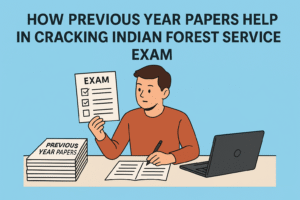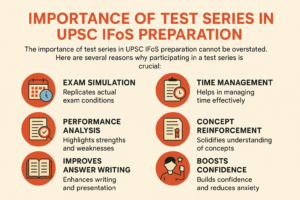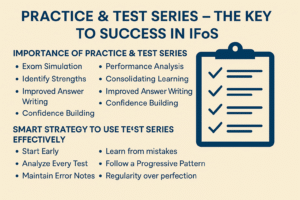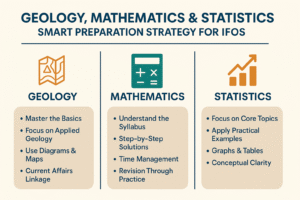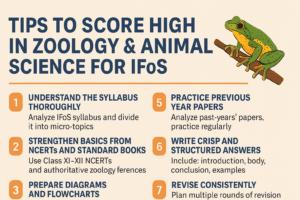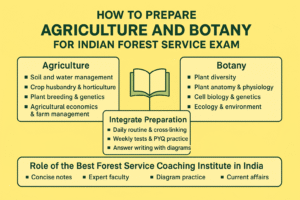Among the 48 optional subjects offered in the UPSC Civil Services Mains Examination, Geography has consistently remained one of the most popular choices for aspirants. Its scientific nature, logical approach, overlap with General Studies, and scoring potential make it highly attractive. Many toppers, including IAS and IPS officers, have secured top ranks with Geography optional.
In this article, we’ll explore the reasons why Geography is such a popular optional, along with preparation tips, booklist, and FAQs for UPSC aspirants.
KEY REASONS WHY GEOGRAPHY IS A POPULAR OPTIONAL
1. Extensive Overlap with GS Papers
GS Paper I: Covers Indian and World Geography, Physical Geography, and Environment.
GS Paper II: Geopolitics, International Relations, India’s boundaries, resource distribution.
GS Paper III: Economic Geography, agriculture, industries, disaster management.
Essay Paper: Topics like environment, sustainable development, urbanization often require geography-based analysis.
2. Scientific and Logical Subject
Geography is based on scientific principles and logical reasoning, unlike purely theoretical subjects.
Easy to understand with maps, diagrams, and case studies.
3. Availability of Resources and Guidance
Abundant books, coaching notes, online resources, and test series are available.
Standard textbooks like NCERTs, Savindra Singh, Majid Husain cover the syllabus systematically.
4. Balanced Combination of Static and Dynamic Portion
Paper I: More static, covering physical geography and theories.
Paper II: Dynamic, includes Indian Geography and current developments.
This balance makes preparation interesting and less monotonous.
5. Scoring Potential
Geography is considered a safe and stable optional with consistent scoring trends.
Use of maps, diagrams, and statistics enhances presentation and fetches higher marks.
6. Utility in Interview & Career
Topics like environment, sustainable development, and regional planning are frequently asked in UPSC interviews.
As future administrators, knowledge of geography helps in planning, disaster management, and policy formulation.
COMPLETE STRATEGY FOR GEOGRAPHY OPTIONAL
Step 1: Build Strong Basics
Start with NCERTs (Class 6–12) to clear fundamentals.
Move to standard books for physical geography and human geography.
Step 2: Cover Paper I Thoroughly
Focus on physical geography: Geomorphology, Climatology, Oceanography, Biogeography.
Learn models and theories (Christaller, Weber, Malthus, etc.).
Step 3: Master Paper II (Indian Geography)
Topics: Agriculture, Industries, Transport, Population, Settlements, Resources.
Link with current affairs like urbanization, environment, climate change, and government policies.
Step 4: Practice Maps & Diagrams
Use India and World maps to mark locations, rivers, industries, and demographic data.
Flowcharts and diagrams help in value addition.
Step 5: Regular Answer Writing
Practice previous year questions and test series.
Structure answers with Introduction – Body – Conclusion.
Always use examples, case studies, and statistics.
BOOKLIST FOR GEOGRAPHY OPTIONAL
Paper I – Principles of Geography
Physical Geography – Savindra Singh
Human Geography – Majid Husain
Models and Theories – Majid Husain
Geography of Population – R.C. Chandna
Paper II – Indian Geography
Geography of India – Majid Husain
Economic and Social Geography of India – NCERTs + current affairs
Indian Economy & Development – Economic Survey + Government Reports
Additional Sources
Atlas (Oxford/Orient Black Swan) for maps.
IGNOU Notes for value addition.
Test Series (Vision IAS, Vajiram, Shankar IAS, etc.).
TIPS TO SCORE HIGH IN GEOGRAPHY OPTIONAL
Use maps in almost every answer.
Quote data from Census, Economic Survey, UNDP, IPCC Reports.
Relate Paper I concepts with Indian examples.
Keep answers analytical, not descriptive.
Revise diagrams and models multiple times.
FAQS ON GEOGRAPHY OPTIONAL
Q1. IS GEOGRAPHY A SCORING OPTIONAL FOR UPSC?
Yes, Geography is considered a stable and scoring subject. With good presentation (maps & diagrams), aspirants often score 270–320+.
Q2. CAN NON-SCIENCE BACKGROUND STUDENTS CHOOSE GEOGRAPHY?
Absolutely. Even humanities students perform well since concepts are logical and resources are widely available.
Q3. HOW LONG DOES IT TAKE TO COMPLETE GEOGRAPHY OPTIONAL?
On average, 5–6 months of focused study is enough to complete the syllabus.
Q4. WHICH IS THE BEST BOOK FOR BEGINNERS IN GEOGRAPHY OPTIONAL?
Start with NCERTs (Class 11 & 12 Physical & Human Geography), then move to standard texts like Savindra Singh and Majid Husain.
Q5. HOW IMPORTANT ARE MAPS IN GEOGRAPHY OPTIONAL?
Maps are indispensable. A well-drawn map can fetch 1–2 extra marks per answer, significantly boosting your total.
Q6. DOES GEOGRAPHY HELP IN GS PAPERS AND ESSAY?
Yes, Geography overlaps with GS-I, GS-II, GS-III, Environment, and Essay, reducing preparation burden.
FINAL WORDS
Geography is one of the most rewarding and popular optional subjects for UPSC Mains. With its scientific nature, GS overlap, scoring consistency, and practical utility, it has been a favorite among toppers for years. By building strong basics, practicing maps and diagrams, and linking answers with current affairs, aspirants can maximize their chances of securing high marks in UPSC Mains.


